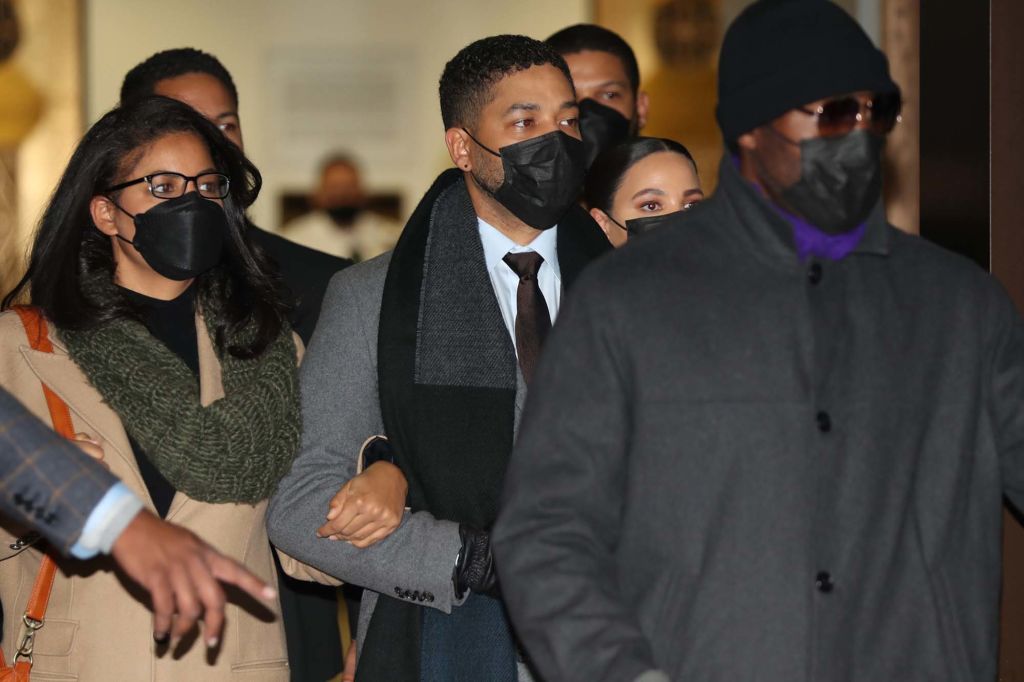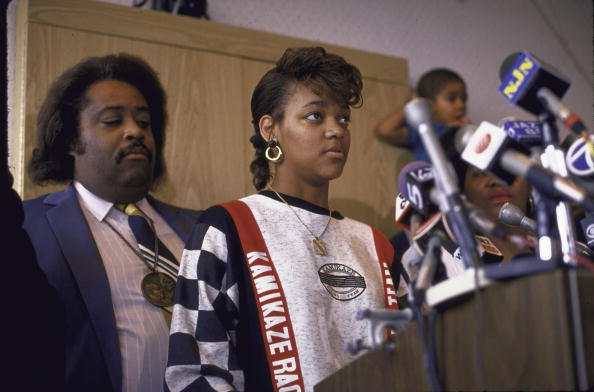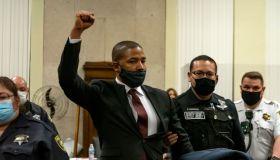Jussie Smollett Hoax: Recalling Tawana Brawley's Hate Crime Claim In 1987
Recalling The Tawana Brawley Case As Jussie Smollett Is Found Guilty Of Staging Racist Hate Crime Hoax

Jussie Smollett, middle, leaves the Leighton Criminal Court Building in Chicago after being found guilty on five of six charges in his criminal trial on Thursday, Dec. 9, 2021. | Source: Chicago Tribune / Getty
As the saying goes, history is bound to repeat itself. However, there is no guarantee that lessons will be learned from it.
That much appeared to be true on Thursday as a Chicago jury found actor Jussie Smollett guilty of lying to police about being the victim of a purported racist and homophobic hate crime that he apparently staged. And while Smollett’s claims were not exactly apples-to-apples with the infamous Tawana Brawley case from more than 30 years earlier, the two instances share a number of notable — and unfortunate — similarities.
MORE: Hate Crime Hoaxes That Are Intended To Spotlight Racism Are Actually Harmful
In Smollett’s case, his claims back in January 2019 immediately stoked the divisive flames of racism because he said the perpetrators placed a rope around his neck, an allegation that evoked imagery of lynching. He also claimed his attackers yelled something about “MAGA,” the Trump-approved acronym that is all but synonymous with racist, anti-Black hatred.
One of the narratives that emerged following Smollett’s claims cast suspicion on the Chicago Police Department — a notoriously corrupt institution — after officers leaked information to the press, something critics said would compromise the investigation.
In the early stages of that case, a number of prominent political and social leaders rushed to Smollett’s defense and demanded an investigation into what was being described as a racist hate crime and a homophobic attack because he is openly gay. They included the likes of then-presidential candidates Joe Biden and Kamala Harris, the latter of whom decried the “attempted modern day lynching.” Biden tweeted at the time, “We are with you, Jussie” and also described the allegations in certain terms despite the absence of any real proof.
Other celebrities and activists promptly rallied behind Smollett.

Tawana Brawley holds a press conference at the Quality Inn as the Rev. Al Sharpton stands behind her. | Source: Bill Foley / Getty
Among them was Rev. Al Sharpton, the civil rights icon who in 1987 found himself in a similar position coming to the defense of another victim of an alleged hate crime: Brawley. At the time, she was a 15-year-old Black girl living in suburban New York City. After being found with “KKK” written across her chest, she claimed she had been kidnapped and raped by six white men.
“We have the facts and the evidence that an assistant district attorney and a state trooper did this,” Sharpton said while working as her family’s spokesperson.
Unlike Smollett’s situation, though, Brawley’s claims never advanced beyond a grand jury, which decided that she orchestrated the grand hoax.
It was later determined that Brawley came up with the story to avoid discipline from her mother’s boyfriend after she ran away from home for four days. Similarly, it is believed that Smollett staged the fake attack against himself for his own ulterior motives: to get a pay raise from his supporting role on the prime-time soap opera, “Empire,” under the apparent belief that viewers would demand more screen time from him following his purported ordeal.
In the end, all we’re left with is two people who tried to manipulate the system in their favor by stoking the flames of racism and consequently shaming all the people who supported them in good faith.
Of course, it would be naive to discount the two systems of justice in America that often leave Black people on the losing end regardless of circumstances. The glaring examples of Black people not getting justice in the American court system are far too many to count. Not to mention how the claims from Brawley and Smollett are far from unbelievable, considering the racial climate in America back in the late 1980s through the present.
However, it would appear that in the cases of Smollett and Brawley, none of those factors applied to their concocted and meritless stories.
Will Smollett’s conviction bring an end to self-serving race-baiting hoaxes? It’s doubtful.
But one thing is for sure: These types of hoaxes only serve to cast doubt on people who are actually victims of such hate crimes, which, according to the FBI, have been surging in recent years and disproportionately affect Black people.
This is America.
SEE ALSO:
25 Years Later, Tawana Brawley Served Court Papers In Defamation Lawsuit



















